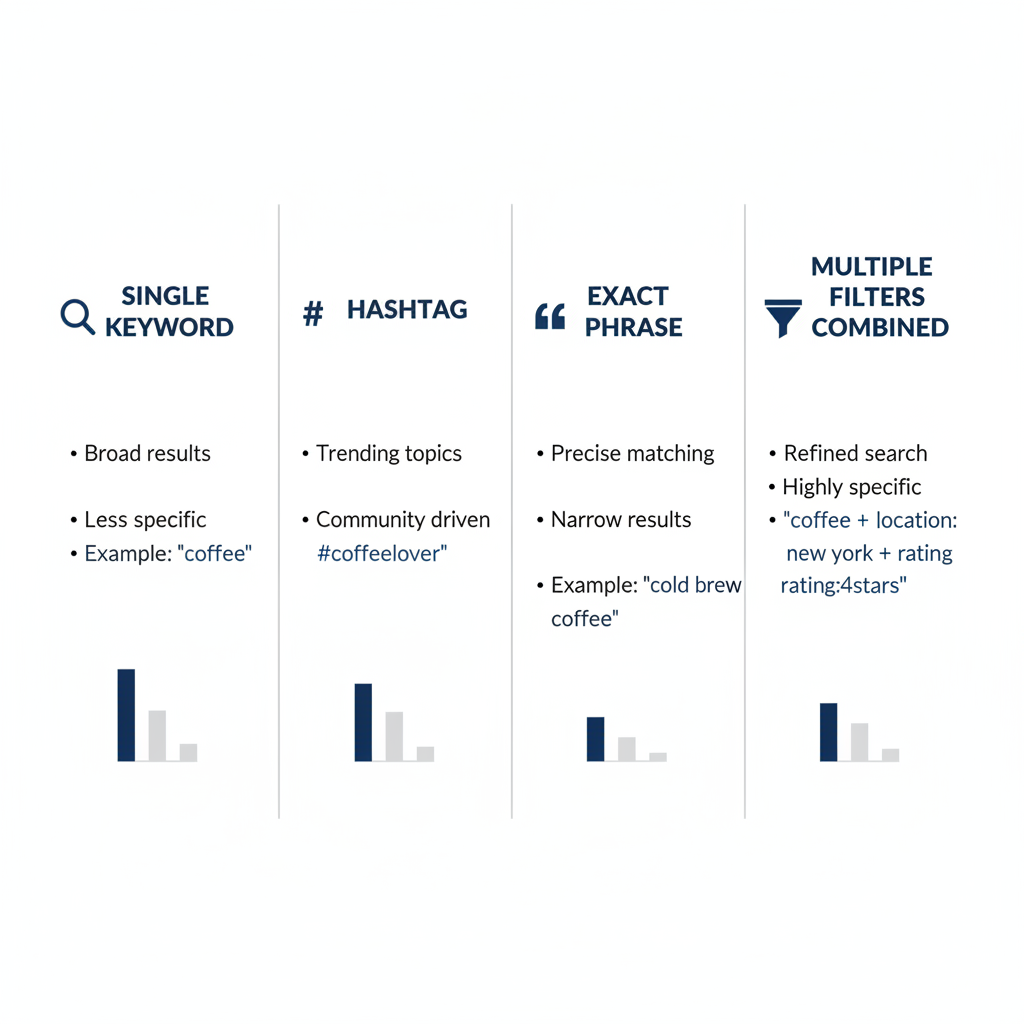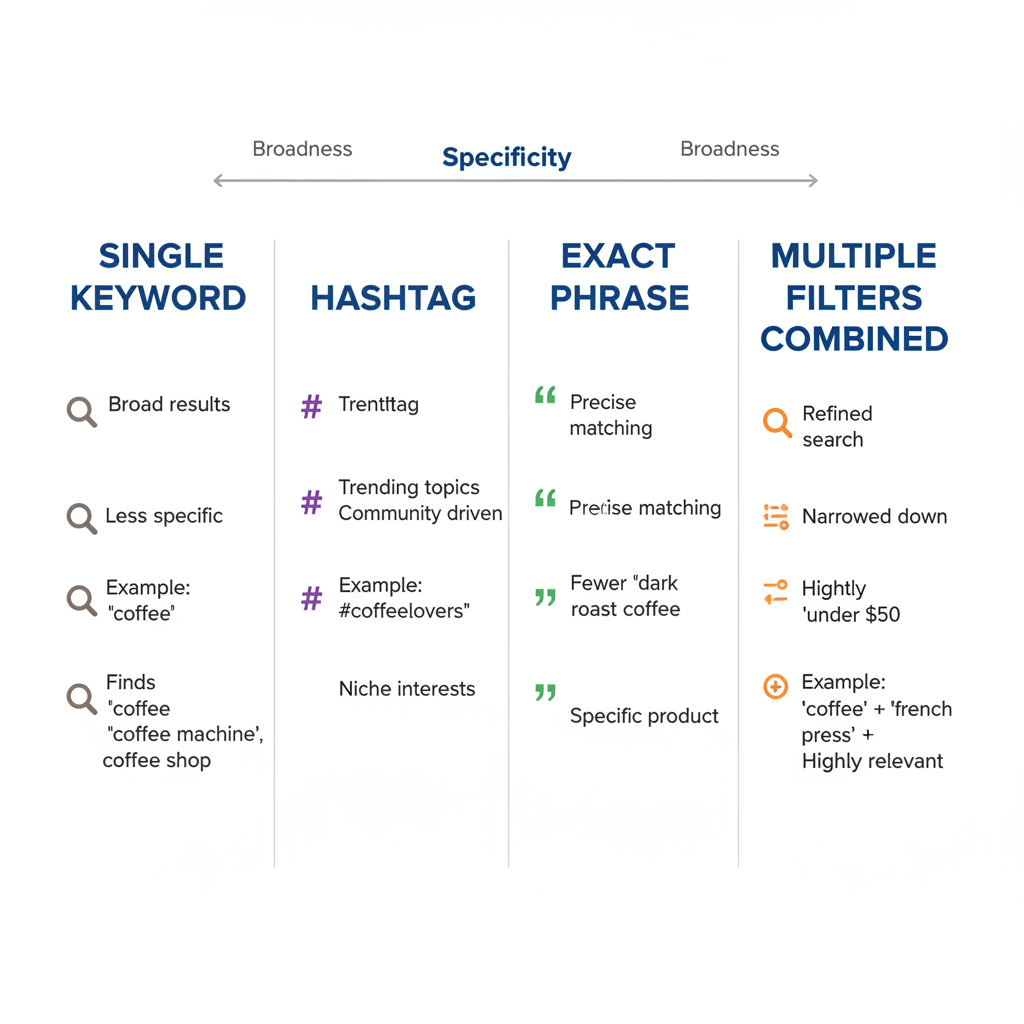Search Someone’s Twitter Posts by Keywords Effectively
Learn how to search someone's tweets by keywords using Twitter search operators, advanced filters, date ranges, and third-party tools for precise results.

How to Search Someone’s Twitter Posts by Keywords Effectively
If you’ve ever wondered how to search someone's Twitter for keywords without endlessly scrolling through their feed, you’re in luck—Twitter’s built-in search operators and advanced tools make it possible to quickly pinpoint relevant tweets. Whether you’re a journalist vetting a source, a recruiter evaluating potential hires, or simply a fan looking for a specific post, knowing how to use these features can save time and improve accuracy.

---
Understanding Twitter Search Operators
Twitter supports several search operators that help refine results and locate posts from a specific account. The most useful commands include:
- `from:` — Restricts results to tweets from a given user.
- Keywords — Add topic terms you want to find.
- `since:` / `until:` — Define date ranges in `YYYY-MM-DD` format.
Example: `from:NASA` finds tweets only from NASA’s official account.
Example: `Mars mission` matches tweets that include this phrase.
Example: `from:NASA Mars since:2022-01-01 until:2022-12-31`.
> Pro Tip: Operators can be combined to make your searches far more precise.
---
Using the “from:username keyword” Format
The simplest method for keyword-based searches on a user’s tweets is:
from:username keywordFor instance:
from:elonmusk TeslaThis retrieves tweets from Elon Musk’s account containing the term “Tesla.” Replace `username` (no `@` symbol) and `keyword` with your chosen handle and term.

---
Applying Advanced Filters
Add search filters to narrow your results even further.
By Hashtags
from:username #hashtagExact Phrases
from:username "exact phrase"Exclude Terms
from:username keyword -excludeCombining Multiple Filters
from:username "climate change" -retweet #researchFilters let you determine precisely what gets included or excluded.
---
Leveraging Date Range Parameters
Date filters are especially useful for investigations, historical analysis, and tracking ongoing topics.
from:username keyword since:2023-01-01 until:2023-06-30This query restricts tweets to your keyword within the first half of 2023.
Benefits
- Contextual relevance to specific events or seasons.
- Reduced noise from irrelevant old posts.
---
Navigating Twitter’s Advanced Search Page
If you prefer form fields over typing commands, Twitter’s Advanced Search interface lets you:
- Search by all words, exact phrases, or any words.
- Filter tweets from or to specific accounts.
- Filter replies, links, and media.
- Set minimum engagement metrics.
- Specify date ranges.

---
Exploring Third-Party Tools
Sometimes Twitter’s native search is limited. External tools can enhance search capabilities:
Popular Options
| Tool | Strengths | Limitations |
|---|---|---|
| TweetDeck | Real-time monitoring, multi-account support | No historical deep search beyond Twitter’s limits |
| Twint | No API rate limits, scrape tweets anonymously | Requires Python knowledge; may violate Terms of Service |
| Social Bearing | Engagement analytics, sentiment | Limited free searches |
| Followerwonk | Profile keyword search | Not focused on tweet text |
---
Setting Up Automated Alerts
Avoid repetitive manual searches by automating alerts.
Using TweetDeck Columns
Add a column with your query:
from:username "keyword"Updates appear in real time.
Automation Apps
Services like Zapier or IFTTT monitor searches and send notifications via email, Slack, or other integrations.
---
Tips to Refine Search Relevance
To get the most targeted results:
- Use exact phrases to match intent.
- Exclude retweets with `-filter:retweets`.
- Use `OR` between keywords for broader coverage.
from:username keyword1 OR keyword2---
Privacy and Ethical Considerations
All public tweets can be searched, but ethical considerations matter:
- Respect privacy—Don’t bypass protected accounts.
- Avoid misrepresentation—Keep tweets in context.
- Follow platform rules—Some scraping tools risk violating Terms of Service.
---
Example Workflows
Journalists
- Identify the account handle.
- Use layered operators to target event-related tweets.
- Filter by date around the event.
- Save query in TweetDeck for updates.
Recruiters
- Search candidates for relevant industry terms.
- Exclude non-professional content.
- Capture examples responsibly.
Researchers
- Collect tweets with thematic date ranges.
- Export search data if allowed.
- Analyze engagement or linguistic patterns.
---
Summary and Next Steps
Mastering Twitter’s search operators, filters, and both native and third-party tools gives you precise control over what tweets you find. Whether combining `from:username` with targeted keywords and date ranges or leveraging automation for alerts, you can work faster and smarter without wading through irrelevant posts. Remember to conduct your searches ethically and in line with Twitter’s terms.
Ready to put these techniques into practice? Try running a custom query today and see how quickly you can locate the exact tweets you’re looking for.




